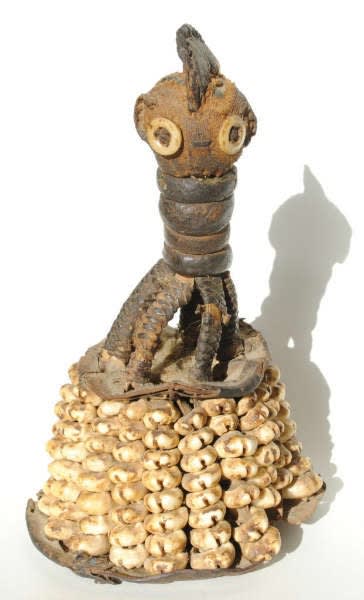
The ibori (sometimes ipori or iponri) symbolizes the ‘inner head’, that is the individual’s personal destiny (ori means head). According to the Yoruba version of the creation, before a human being is born Obatala models his or her body from clay and the sky god Olorun blows vital force into it. The heads however are made by Ajala, the potter from orun (‘the other world’). Everybody can choose his own ‘inner head’. Ajala is a careless potter, and sometimes the heads are underbaked or overbaked. An individual who unwittingly chooses a badly made ‘inner head’ starts life with a serious and lasting handicap. The quality of the chosen head determines a person’s destiny during his life on earth.
The ipori is the symbol of a person’s spiritual essence and individuality. It consists of a conical leather pouch into which the Ifa priest pours dry sand on which he has previously imprinted the Ifa formula for ori. Additionally, the container is packed with ingredients associated with one’s ancestors, gods, and the restrictions or taboos (ewo) one must abide by. It thus contains everything essential to a person’s life. After special prayers and songs, the pouch is sewn up and sealed; it is then decorated with rows of caurie shells. Altogether it forms an abstract human form with a stylized head or conical form to convey something of the inner or spiritual life of individuals. The package of the above example is surmounted by a stylized human head with the tall-crested agogo hairstyle, button eyes and small round ears. The ibori are kept in an ile ori or ‘house of the head’. Such an ile ori is a container with a lid, made of cloth and leather and covered with caurie shells.
The Amsterdam auction house De Zwaan is offering three ibori in their next sale on 4 November – see below (with a very friendly estimate of € 150 – 300, and selling for € 260).
